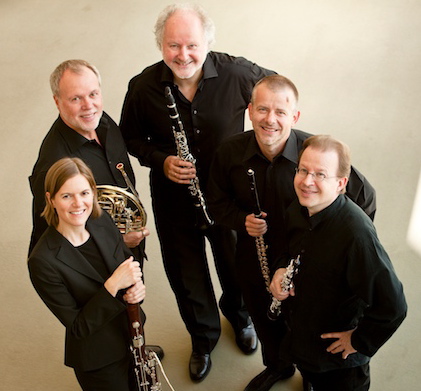Berlin Philharmonic Wind Quintet triumphs over distractions at Mandel Hall

“They’re going to do Samuel Barber’s Summer Music instead of the Elliott Carter,” said a gentleman, noting the program change prior to the start of the Berlin Philharmonic Wind Quintet concert at Mandel Hall.
“I’m not sorry,” said his female companion.
Programming tastes aside, amid divers obbligato distractions, the Berlin Philharmonic Wind Quintet largely lived up to their orchestra’s reputation Friday night in a venturesome program in the University of Chicago Presents series.
Unlike its storied parent ensemble, founded in 1882, the Berlin Philharmonic Wind Quintet is a relatively recent creation, started in 1988. The group has created a daunting discography in just over two decades and still contains four of its five original members (bassoonist Marion Reinhard, the only woman, replaced Henning Trog last year).
The five musicians—flutist Michael Hasel, oboist Andreas Wittmann (a descendant of Franz Liszt), hornist Fergus McWilliam, and Reinhard— had to conjure with the venue’s dryish acoustic yet the group still brought the polish, whirlwind bravura and personality-plus solo playing one would expect.
The Hungarian first half looked more forbidding on paper than it proved in actuality, with the opener, Antiche Danze ungheresi dal secolo XVII by Ferenc Farkas proving a fine calling card. Farkas’ 1959 revamping of various 17th-century Hungarian marches is a kind of Magyar Respighi, the Baroque themes deftly deployed among the five instruments, and the quintet brought out the stately dignity, folkish element and virtuosity, particularly, of the Ugros finale.
Gyorgy Orban’s Wind Quintet is of more recent vintage, written in 1985. Crafted in three short movements, the music segues from impressionistic solos to a Satie-in-Budapest frivolity. McWilliam brought atmospheric expression to the central movement’s horn solo and the finale’s breezy bravura was tossed off with panache by all, the players seamlessly surmounting the difficulties.
The players also brought out the quirky wit and challenges of Ligeti’s concise Six Bagatelles. Hasel artfully doubled on piccolo and the players conveyed the finely honed coloring and bursts of staggering virtuosity with especially fine playing by clarinetist Seyfarth.
In his spoken remarks after intermission, McWilliam explained that the Barber work was subbed for the Carter because of a Homeland Security issue, without going into the details. (Are TSA officers now doubling as critics?) Though a bit less pristine, the rendering of Summer Music brought out the lyric languor as well as the vivacity.
Carl Nielsen took a break from composing his Fifth Symphony to write his Wind Quintet of 1922, a work inspired by his friendship with members of the Copenhagen Wind Quintet. Woodwind solos figure prominently in the Danish composer’s orchestral works and here the music is richly characteristic in its mix of relaxed rustic charm and wry sophisticated wit.
The Berlin musicians made the most of the outsized wind writing from Reinhard’s opening bassoon solo and the spotlighted duetting for her and Seyfarth’s clarinet., as well as Wittmann’s doubling on English horn at the start of the finale. That closing movement is the heart of the Quintet with a set of variations on one of Nielsen’s most indelible melodies. The musicians brought out the robustly characterful writing of the wide-ranging permutations magnificently, including the operetta-like comic duet between clarinet and lowing bassoon, spotlighted horn solo and grand, concluding restatement of the chorale theme.
Note: It’s too bad these fine musicians had to compete with more disturbances than usual Friday night. A whistling hearing aid was so loud at the end of the first movement of the Nielsen that the players had to stop until it was located and turned down. And the entire concert was besieged by a mysterious yet persistently audible rhythmic counterpoint, apparently caused by an audience member’s mechanical breathing apparatus, which threatened to turn the performance into an aleatoric work by John Cage.
Posted in Performances






Posted Feb 01, 2010 at 10:19 am by Joe
Barber appears to have settled into his niche: He’s the guy you substitute when there isn’t enough time to rehearse Carter or Ives.
Posted Feb 02, 2010 at 11:23 am by Joe
Curious about the “homeland security issue,” I sent Fergus McWilliam an e-mail asking for elaboration and received this reply: “More mundane and inane than a mere fear of Carter: hand luggage regulations permit taking only one music instrument on board and the necessary ‘equipment’ for Carter (and Pavel Haas) had to stay behind in Berlin. Perhaps all these new regulations can however be seen as a joke. A sad one.”
As a friend commented, “TSA hasn’t yet caught up with the idea of doubling.”